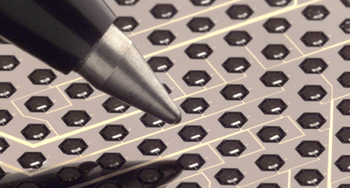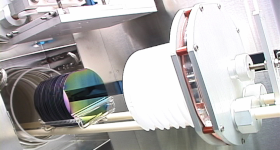Polycrystalline Silicon Carbide
Silicon carbide's strength, thermal conductivity, and stability in extreme environments make it a useful material for electronics and MEMS.
- Typical Film Thickness: 0.3 µm
- Batch Size: 25
- Deposition Rate: 6 - 9 nm/min. (60 - 90 Å/min.)
- Deposition Gases: Methylsilane, Dichlorosilane, Hydrogen, Acetylene, Ammonia
- Deposition Temperature: 700 - 900 °C
- Residual Stress: 200 - 1400 MPa
Some common precursors include:
- SiH4 + C2H4
- SiH2Cl2 + C2H2
- 1,3-Disilabutane
- Methylsilane
NH3 is commonly used for n-type doping while (CH3)3Al is used for p-type. The recipes using organosilicon precursors can be done at lower temperatures. 1,3-disilabutane, however, has several disadvantages: it is expensive, liquid, and relatively low-purity. Its purity also degrades over time, leading to excessive run to run variation. The methylsilane process is thus recommended. Some process relationships are:
- Increasing pressure in the range 0.17 - 1.7 Torr increases film stress and decreases growth rate.
- Around 800 °C, film stress reaches a minimum and the growth rate reaches a maximum.
- Stress reaches a minimum with the replacement of 9% of the methylsilane with dichlorosilane.
Applications: high-temperature and chemically-resistant MEMS, high-power and high-voltage devices, resonators, passivation.
LPCVD Processes
- Silicon Carbide Devices
- Silicon Nitride Resonators
- Doped Silicon by LPCVD
- POLYSILICON LPCVD WITH SILANE (SiH4)
- POLYSILICON LPCVD WITH DISILANE (Si2H6)
- LTO, DOPED LTO, BPSG, BSG, AND PSG LPCVD
- HTO LPCVD
- TEOS LPCVD
- Silicon Nitride LPCVD
- Low-Stress Silicon Nitride LPCVD
- Stochiometric Silicon Nitride LPCVD
- Silicon Oxynitride (SiNxOy) LPCVD
- Silicon Germanium (Si-Ge) LPCVD
- SIPOS (Semi-Insulating Polycrystalline Silicon)
- Polycrystalline Silicon Carbide
- Epitaxial Silicon
- Nano Materials LPCVD



